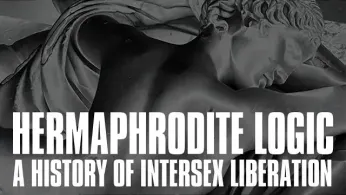
4 hours ago
Juliana Gleeson’s “Hermaphrodite Logic” Illuminates the Untold Story of Intersex Liberation
READ TIME: 3 MIN.
Juliana Gleeson, a respected writer, comedian, and historian, has released her latest work, “Hermaphrodite Logic: A History of Intersex Liberation,” published by Verso Books in June 2025 . The 230-page book is already drawing attention for its in-depth exploration of the intersex rights movement and its impact on both the LGBTQ+ community and society at large .
For much of modern history, intersex people—those born with physical sex characteristics that do not fit typical definitions of male or female—have faced invisibility, misunderstanding, and medical intervention without consent. While roughly one in every hundred people is estimated to be born intersex, their stories and struggles have often been omitted from mainstream narratives about gender and sexuality .
In “Hermaphrodite Logic,” Gleeson traces the evolution of intersex activism from the early 1990s, when advocates first began to organize in response to medical practices that prioritized cosmetic and binary understandings of sex over the well-being of intersex children . The book weaves together philosophical analysis, historical research, and personal testimony to highlight how intersex people have resisted erasure and fought for their rights .
Central to Gleeson’s account is the history of pediatric surgeries performed on intersex children—procedures such as clitoral reductions or hypospadias repairs, often carried out without informed consent and with little consideration for long-term consequences. The book documents how, throughout the 20th century, these interventions were driven by a desire among medical professionals and parents to assign children to binary gender categories, frequently resulting in irreversible physical and psychological harm .
Gleeson credits a new generation of intersex activists in the 1990s with bringing international attention to these practices, emphasizing their devastating effects on bodily autonomy and mental health. Through protests, public speaking, and the creation of supportive communities, these activists challenged both the medical establishment and broader societal norms, demanding an end to non-consensual surgeries and the recognition of intersex people’s right to self-determination .
“Hermaphrodite Logic” goes beyond chronicling events, offering a philosophical critique of how sex and gender have been constructed and regulated. Gleeson argues that the history of intersex people reveals the limits of binary thinking and exposes the ethical failings of systems that pathologize natural human variation .
Blending activism with theory, the book calls on readers—including healthcare professionals, policymakers, and allies—to recognize the diversity of sex traits and to support an inclusive approach to human rights. Gleeson’s work situates intersex liberation as central to broader LGBTQ+ and feminist movements, showing how challenges to medical authority can foster new understandings of freedom, consent, and community .
Early reviews and responses from the LGBTQ+ community and allied organizations underscore the book’s importance in filling a long-standing gap in queer and medical history . The launch of “Hermaphrodite Logic” has been accompanied by a series of public events and discussions, including a book launch hosted in January 2025, where advocates and scholars gathered to reflect on the journey and future of intersex liberation .
Gleeson’s work is being hailed as a vital resource for anyone seeking to understand the intersections of gender, medicine, and human rights. By documenting the resilience and creativity of intersex people, the book offers a powerful message of hope and a blueprint for continued advocacy .
As intersex issues gain increased visibility within the global LGBTQ+ movement, “Hermaphrodite Logic” is poised to play a major role in shaping conversations about inclusion, justice, and the right to bodily autonomy. Gleeson’s meticulous research and accessible storytelling ensure that the voices and experiences of intersex people are no longer relegated to the margins, but recognized as essential to the ongoing struggle for equality and liberation .






